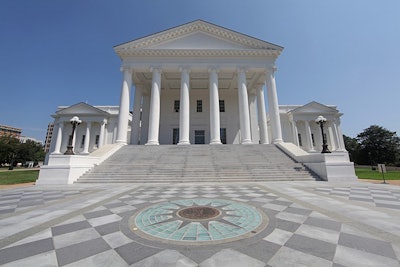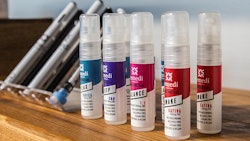
While decriminalization bills have faced opposition and defeat in Virginia’s legislature this session, the state has the chance to make policy history when it potentially expands its restrictive medical cannabis oil program from the singular qualifying condition of intractable epilepsy to any diagnosed condition.
The Joint Commission on Healthcare conducted a study on medical cannabis expansion in the state and determined physicians are best-suited to make decisions about which patients can benefit from medical marijuana. Identical bills to expand the program have been introduced in Virginia’s House (HB 1251) and Senate (SB 726), and have passed the legislature unanimously. The legislation has been amended by Gov. Ralph Northam to include an emergency enactment clause, meaning as soon as the final bill passes the legislature, it goes to the governor to be signed into law immediately.
“We have two bills—they’re identical—and these were promulgated from the Joint Commission on Healthcare through work that we did,” said Jenn Michelle Pedini, executive director of Virginia’s NORML chapter, which lobbies year-round for marijuana policy reform in terms of criminal justice and healthcare reform. “It’s pretty huge. These bills, they’re strong, bipartisan bills because they came out of that commission.”
“I expect [Gov. Northam] to sign it without issue,” said Zach Mauldin, Marijuana Policy Project’s (MPP) legislative counsel for Virginia, in an emailed statement to Cannabis Business Times. MPP has helped drive legislation in the state through public outreach to educate and encourage voters to actively pressure the legislature to pass the expanded medical bills, as well as a decriminalization measure.
“The medical cannabis bills from the 2018 session have been a huge step forward for Virginia,” Mauldin added. “While we hoped that decriminalization would be a greater legislative priority, the expansion of the CBD/THC-A program can't be overstated; it will provide relief to thousands of Virginian patients.”
“Virginia [is] kicking this market wide open on the east coast and having this novel approach that the southern and east coast states have not yet adopted,” Pedini added. “We’ve seen quite a smattering of these CBD, no-THC, negligent-THC, single-condition programs, but nobody’s done this. We hope this will set a policy standard for the rest of the country.”
The Growing Medical Program
In 2015, Virginia passed a law allowing intractable epilepsy patients and caregivers to possess low-THC oil derived from whole-plant extractions, Pedini said. The oils are capped at five-percent THC. The new legislation, if signed by Gov. Northam, will expand this law to allow possession for any Virginian with a signed certificate from their physician, Pedini said.
In August 2017, the state Board of Pharmacy (BOP) enacted emergency regulations for the medical cannabis oil program, although permanent regulations have not yet been issued.
“These regulations will become even more important once the legislature passes this year's CBD bills,” Mauldin said. “Now that HB 1251 has passed the legislature, the Board of Pharmacy is going to have to get to work on promulgating those regulations since the bill will become law as soon as it is signed. It will take time to get processors up and running once the regulatory scheme is set up.”
Patients will likely not have access to cannabis oil until 2019, according to an emailed statement from the BOP.
“A Regulatory Advisory Panel with broad representation of stakeholders, including pharmacists, neurologists, current and former cannabis facility owners, family members of children using cannabidiol oil for the treatment of epilepsy, members of the Boards of Pharmacy and Medicine, and advocates for safe access as well as drug coalitions, developed the regulatory language for Board of Pharmacy consideration,” a spokesperson for the BOP said in the emailed statement to Cannabis Business Times. “Final regulations will likely be adopted by the Board in March or June 2018,” the spokesperson noted, adding that there will be a public comment period.
The emergency regulations allow for five state-licensed, vertically integrated “pharmaceutical processors” to produce and sell the oil. One processor is allowed per health service area, according to a state BOP regulation mandating that only one regulated facility is allowed per health service area upon implementation of any new program, not just the medical cannabis program. The BOP has indicated that an application process for processors will open in spring 2018.
“Because the law restricts the number of pharmaceutical processor permits which may be issued to five, one per health service area as defined by the Board of Health, a competitive application process is necessary,” the BOP’s statement said. “Thus, a Notice of a Request for Application will be published in the spring of 2018, which will direct interested parties to submit application for consideration.”
Once the medical program is operational, patients will be required to register, as is typical in other states, Pedini said. Physicians will also register and will be required to have continuing medical education (CME) credits in cannabis medicine, which are available online.
“They’re already taking CMEs every year … —it’s nothing novel,” Pedini said. “Do physicians really need education in order to say, ‘Hey, you can try this if you want?’ Probably not, but it will be helpful in allowing them to better serve their patients past just making that recommendation.”
The Prospects of Decriminalization and Legalization
While the state’s medical cannabis oil program is likely to expand, decriminalization bills continue to be defeated in the legislature. At the end of January, Republicans on a Senate committee killed SB 111, which would have changed the penalty for the possession of small amounts of marijuana from a criminal misdemeanor to a civil penalty.
“There is no chance [of a decriminalization bill passing],” Pedini said. “All of the decriminalization bills for the 2018 legislative session have been defeated. This is absolutely not reflective of public opinion—eight out of 10 Virginians support fines, not crimes. However, this legislation, and the whole of criminal justice reform legislation, goes through two specific committees—one in the House and one in the Senate—and these committees are composed primarily of prosecutors. That’s the bottleneck on criminal justice reform as a whole in Virginia, and marijuana policy is no different.”
Senate Majority Leader Thomas Norment, Jr. (R-James City), has introduced SB 954, a bill that eliminates jail time for first-offense possession and allows for expungement, but Pedini said it is not the decriminalization measure Norment promised to propose.
“Sen. Norment had said for well over a year that he was going to introduce a decriminalization measure, which excited not only NORML, but also his constituents and Virginians, as well, because when the senate majority leader introduces a bill, that gives it legs,” Pedini said. “Now, he ultimately did not, and what he introduced is an expungement bill, and it’s not a good expungement bill.”
“It is a step forward, but it is particularly disappointing because last year, the bill's primary sponsor and Senate Majority Leader, Tommy Norment, said he would introduce a decriminalization bill,” Mauldin added. “He changed his position after the beginning of the session and introduced SB 954, which is very modest forward progress.”
Norment’s legislation codifies the existing first-time offenders program and creates an opioid fund into which defendants must pay $300. It also creates a marijuana offender registry.
“Even though you’re supposed to be able to expunge your crime, there’s still a record of it right there,” Pedini said.
The expungement piece of Norment’s bill allows offenders to pay $150 to have their records expunged, but regular expungement costs $78 in Virginia, Pedini notes.
“This is a terrible bill—we don’t just not support it, we actively oppose it now,” she said.
The Virginia Senate has passed the legislation, which is now awaiting a vote in the House Appropriations Committee.
NORML is having conversations with legislators now regarding its opposition of the measure, Pedini said.
Looking beyond decriminalization, Pedini said legalization in Virginia is likely at some point, although it will take time.
“The inevitable endgame, of course—not just [for] Virginia, but for any state—is to regulate adult-use marijuana,” she said. “That’s absolutely the safest approach for any community. We shouldn’t leave the regulation of that type of market in the hands of criminal enterprise. But that’s a long road in Virginia.”
“Until there’s a shift in federal policy or a major shift in the makeup of our legislature, Virginia will continue to work on … expanding our medical cannabis program,” Pedini added. “We’ll need to expand the allowed cannabinoid content, and we’ll need to lift the restriction of extraction-based only products. Then, of course, on the criminal justice side, [decriminalization] is at the forefront of our work—so [is] expungement.”
Mauldin agreed that the medical program should be the state’s focus right now, followed by decriminalization efforts.
“The immediate next step is to get the expanded CBD/THC-A program operational,” he said. “Once it is up and running, we can work on an expanded medical marijuana program. The next major legislative step is real decriminalization, which I believe will happen in the next few years. There has been steady incremental progress in the commonwealth. They are baby steps, but they are steps nonetheless. Full legalization seems improbable in the foreseeable future; while the majority of Virginians support it, support in Richmond simply isn't there.”
Top image: © Lucy Clark | Adobe Stock


























